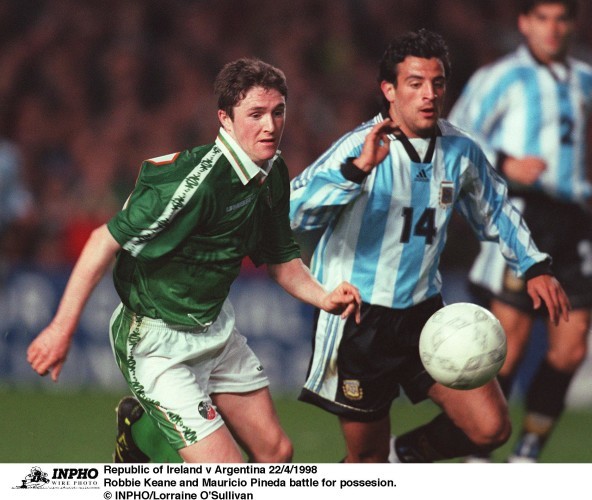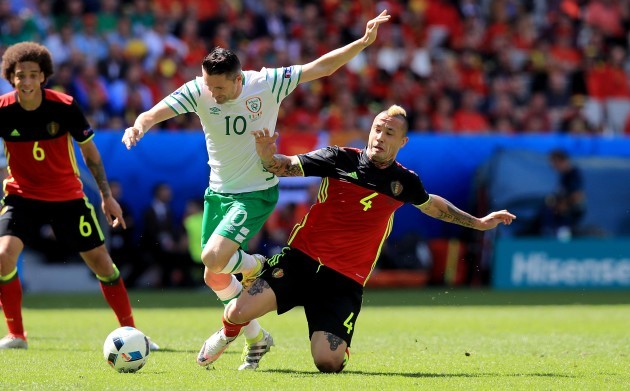ONE TIME, DURING a discussion about promising young footballers who never made the grade, Robbie Keane was asked who the best player in Dublin was when he was growing up.
A beat.
“Huh! Me, of course!”
Keane was that very rare thing for an Irish footballer: he was also a star. He was cocky and confident, and believed that the abilities he had made him special. We don’t produce many like him.
While travelling in Thailand in late 2000, I got talking to some locals in a bar.
“Where you from?”
Ireland.
“Island?”
Yeah. Eye-er-land!
“Ah, Ireland!” [A look at each other]
“Roy Keane!” [Another look]
“Robbie Keane!”
The name of Ireland’s future captain, even by the age of 20, tripped off tongues from south-west Dublin to south-east Asia.
By that stage he had just made the audacious move to Inter Milan that, although short-lived, was in keeping with his penchant for the bold, the flash.
Just three years after his debut with Wolves, he was already synonymous with impudence and guile.
It’s what many this week are pointing to as the hallmark of the ‘street footballer’. The ability to improvise, to produce unexpected moments of lethal imagination in the tight confines of the penalty box.
And it is not just Ireland that doesn’t make them like Robbie Keane anymore.
His were the qualities Arsene Wenger was talking about in 2014 when he considered why most top strikers are now produced in South America, rather than through the highly-structured European system.
“Maybe in our history street football has gone. In street football when you are 10 years old, you play with 15-year-olds so you have to be shrewd, you have to show that you are good, you have to fight, win impossible balls,” Wenger said.
When it is all a bit more formulated then it is developing your individual skill, your fighting attitude less. We have lost a little bit of that in football.
Mick McCarthy, the Ireland manager who gave Keane his debut, took up a similar theme on RTÉ radio during the week.
“He played like a street footballer,” said McCarthy. “Like kids used to but he had an intelligence that was way beyond his years as a 17-year-old kid in how he played and how he understood the game.”
But that doesn’t quite cover the cheek and impertinence of the young Keane, as McCarthy is well placed to recall.
The manager liked to join training matches with the Ireland squad in those days, only to find himself the victim of persistent nutmegs by the new kid.
As the boss grew more enraged, and the other players more amused, so the ritual torture would increase.
I saw Keane for the first time, in the flesh, in his home debut against Argentina at Lansdowne Road in April 1998.
It was an unforgettable show, as exciting for the promise of what was to come as the shimmies and flicks and outrageous confidence already on display.
There was never any chance that the young Keane would shrink in the limelight. The star had found his stage; it was meant to be.
I remember the man of the match announcement that day.
“Man of the match today is…..”
Yes….?
“Number 10…..”
Yeeeesss…?!”
“For Argentina, Ariel Ortega!”
Oh.
It wasn’t the last time that Keane wouldn’t get the credit he deserved.
Keane’s confidence, that bit of arrogance that made him special, didn’t always endear him to his countryfolk.
In truth, a lack of lightning pace and the falling out of tactical fashion of the orthodox goal-poacher meant Keane never became one of the absolute elite players, like his namesake from Cork. But ambivalence toward Keane in Ireland stemmed from a distaste for the same cocksure attitude that made him special.
Keane’s peak years also coincided with the explosion in Premier League TV revenue and the growth of a chasm between the players and the people who paid their wages.
Despite his enduring dedication to his country, and his consistent delivery of international goals, it was felt that Keane was of English soccer — flash, vainglorious — in a way that made him unrelatable, unlike, say, the humble and virtuous Brian O’Driscoll.
There was a hint of class snobbery in there too, as often happens when working class kids get rich.
It’s only now that he’s gone, or going, that we realise what we’ve lost. It’s not just street footballers we don’t produce anymore.
Ireland’s ability to provide players to the top level of the English game has long been in decline.
Our national team’s star quality dimmed as Keane’s powers faded, though for the wider world he remained our only recognisable name. And yet his final chapter with Ireland suggested his love of his country would survive the moving of the spotlight on to others.
I recall asking him at a late career press conference whether he would still join up with Ireland squads if his place in the team was no longer guaranteed.
“If I’m not wanted, I won’t hang around,” he said, dreading the thought of being a watching stiff. But he did hang around.
For the latter part of the Euro 2016 qualifying campaign, and the finals themselves, his usefulness on the pitch was outweighed by his presence off it.
He helped his younger team-mates cope with the pressures of France, not least with his well-known fondness for a good sing-song, which is undiminished by a rather dodgy singing voice.
He’ll get the love he’s long deserved when he leaves the stage for the final time on Wednesday. And then our last superstar will head back, appropriately enough, to Los Angeles, where he has fitted in just fine.
The42 is on Snapchat! Tap the button below on your phone to add!



